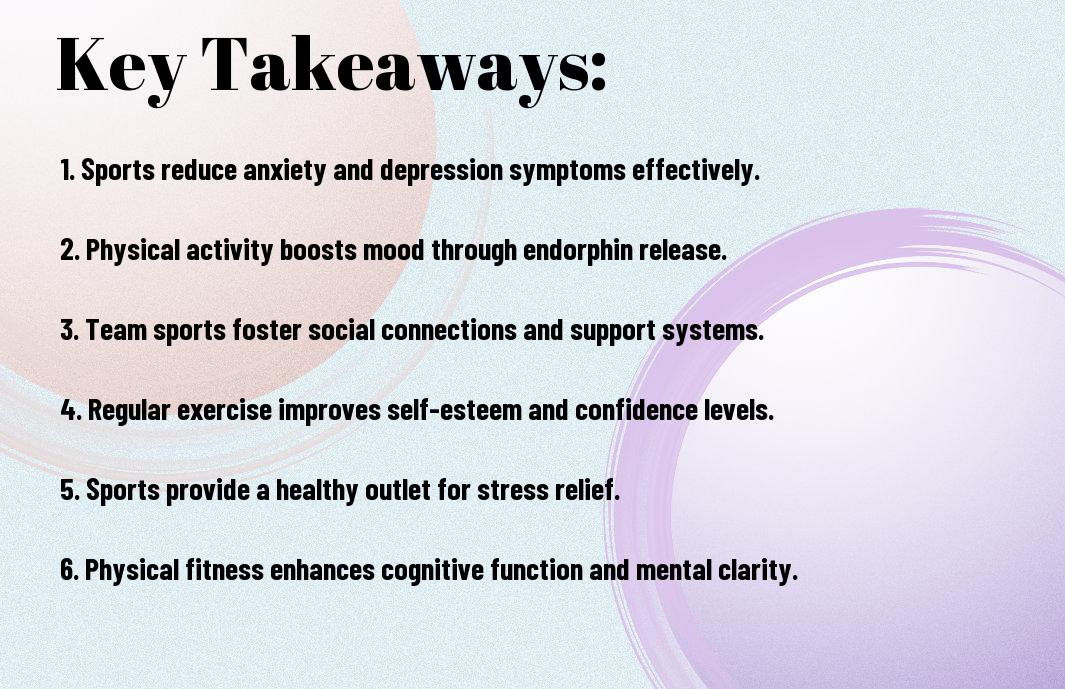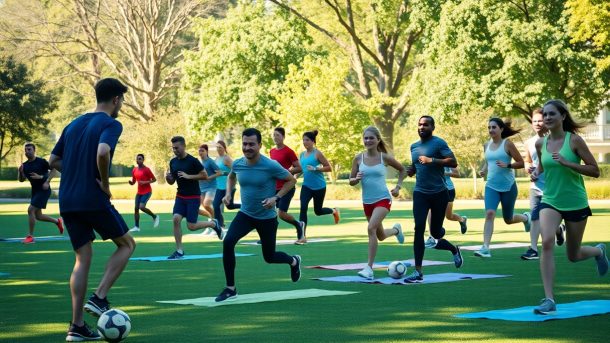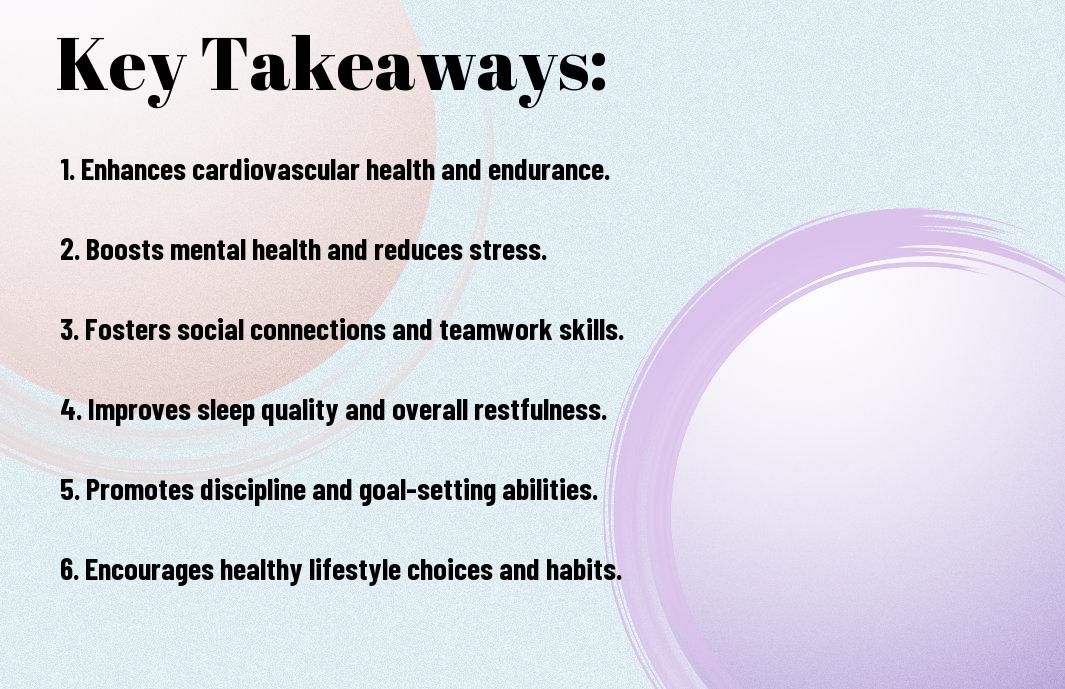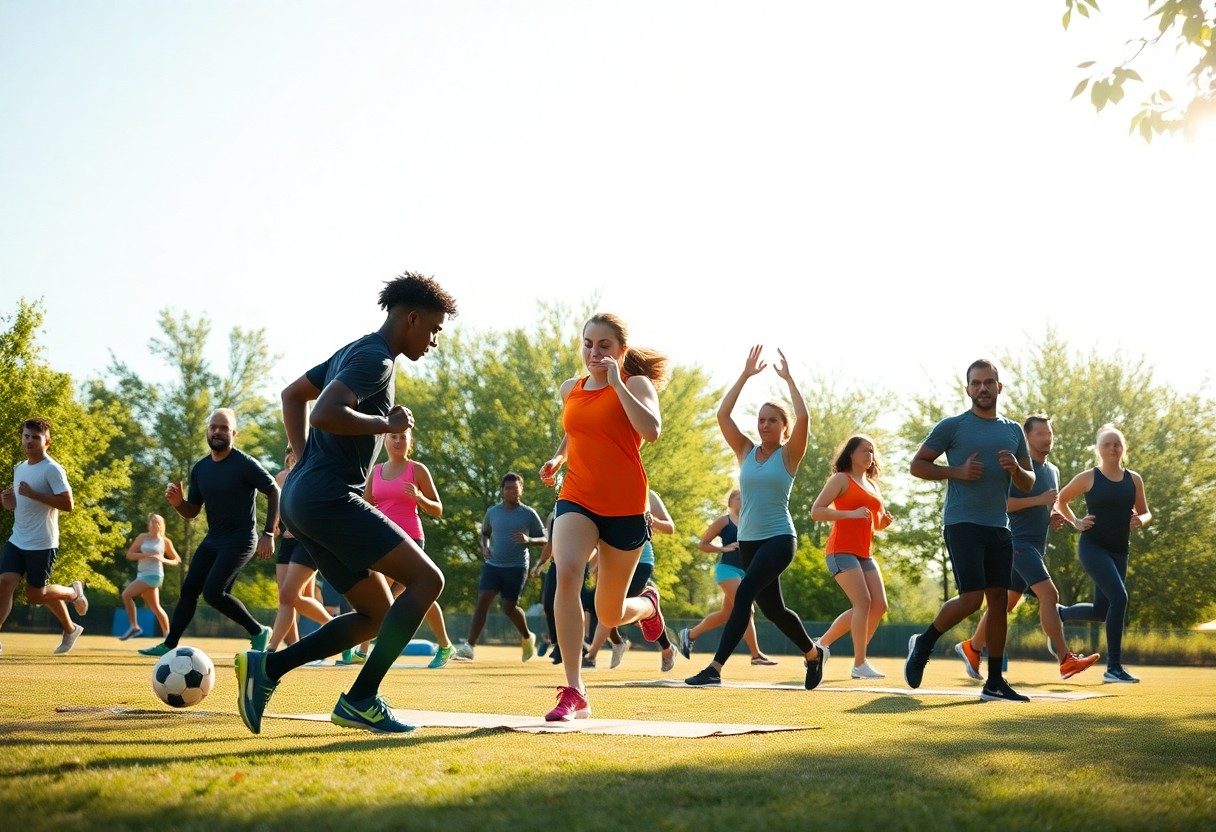You may not realize it, but engaging in sports can significantly enhance your mental health and overall wellbeing. Physical activity promotes the release of endorphins, which can improve your mood and reduce symptoms of anxiety and depression. Participating in team sports also fosters social connections, giving you a support network to lean on. Moreover, the discipline and focus required in sports can boost your self-esteem and provide a sense of achievement. In this blog post, we will explore how incorporating sports into your routine can lead to a healthier mindset and improved emotional resilience.
Key Takeaways:
- Physical Activity: Engaging in sports promotes physical fitness, which is closely linked to improved mood and overall mental health.
- Social Interaction: Team sports foster connections and friendships, reducing feelings of isolation and enhancing emotional support.
- Stress Relief: Participation in sports serves as a healthy outlet for stress relief, helping to manage anxiety and enhance relaxation.
- Discipline and Routine: Regular involvement in sports helps establish a sense of discipline and routine, positively impacting mental stability and focus.
- Self-esteem: Achievement in sports can boost self-esteem and confidence, contributing to a more positive self-image.
The Link Between Physical Activity and Mental Health
As you engage in physical activity, you may notice a profound connection between your body and mind. Exercise not only enhances your physical fitness but also serves as a powerful tool for improving your mental health. Activities such as running, swimming, and team sports can significantly reduce symptoms of anxiety and depression, elevate your mood, and promote a sense of overall well-being. The regular practice of physical activity fosters resilience, making it a vital component of a healthy lifestyle.
Biological Mechanisms
About the biological mechanisms at play, physical activity stimulates the production of neurotransmitters like endorphins and serotonin. These chemicals play a pivotal role in regulating mood and creating feelings of happiness. Exercise also increases blood flow to the brain, which can enhance neural connectivity and promote cognitive function, ultimately contributing to improved mental health.
Psychological Benefits
Against common misconceptions, engaging in regular physical activity does more than just strengthen your body; it provides significant psychological benefits that can uplift your spirit and enhance your mental clarity. You might find that incorporating exercise into your daily routine can help alleviate stress and anxiety, enabling you to cope better with life’s challenges.
And with each session of physical exercise, you may experience a boost in self-esteem and confidence. This positive feedback loop can empower you to set and achieve goals, leading to a greater sense of accomplishment. Additionally, the social aspects of team sports or group classes can foster connections with others, further enhancing your emotional well-being. By prioritizing physical activity, you are not only investing in your physical health but also nurturing your mental resilience.

Sports as a Tool for Stress Relief
While life can often feel overwhelming, engaging in sports offers a practical outlet for stress relief. Physical activity triggers the release of endorphins, the body’s natural mood lifters, which can significantly reduce feelings of anxiety and tension. By immersing yourself in sports, you not only channel your energy into something productive but also enhance your overall mental wellbeing. The rhythm of your favorite game or workout can serve as a meditative escape, allowing you to step away from daily pressures and focus on the present moment.
Coping Mechanisms
Relief from stress is one of the most immediate benefits of participating in sports; it allows you to redirect your thoughts and emotions into physical action. This active engagement helps you process feelings in a healthy way, reducing the likelihood of anxiety build-up. By developing consistent sports habits, you craft reliable coping mechanisms that equip you to handle life’s challenges more effectively.
Social Interaction and Support
Behind each sporting endeavor lies the opportunity for meaningful social interaction and support. Engaging in team sports or group activities fosters a sense of community, allowing you to connect with others who share your interests. This network can be invaluable, providing emotional support and a sense of belonging that contributes positively to your mental health.
For instance, being part of a community sports team fosters friendships that extend beyond the playing field. As you practice and compete together, you build strong bonds with teammates, who can act as a support system during tough times. The camaraderie experienced in sports often leads to a shared sense of achievement, which can boost your confidence and reinforce your mental resilience. This social aspect is particularly beneficial as it combats feelings of loneliness, offering you a sense of purpose and connection in your life.
The Role of Team Sports in Building Resilience
Now, consider how participating in team sports can significantly enhance your ability to withstand and bounce back from life’s challenges. Engaging in team environments not only fosters a sense of community but also cultivates important skills required for navigating stress and adversity. As you face pressures from competition and collaborate with teammates, you develop emotional strength and adaptability, both pivotal in building resilience.
Enhancing Teamwork Skills
An important aspect of team sports is the development of effective teamwork skills. When you work together with others towards a common goal, you learn to communicate, empathize, and support each other, enhancing your interpersonal skills. This collaboration not only achieves improved performance on the field but also equips you with valuable skills for navigating relationships and challenges in everyday life.
Overcoming Challenges
The process of overcoming challenges is integral to your growth as an athlete and an individual. In moments of high pressure, you learn to confront obstacles head-on and adapt strategies as necessary. This experience builds your confidence and reinforces a proactive mindset, which can be applied beyond sports into various aspects of your personal or professional life.
Building resilience through overcoming challenges in team sports prepares you for unexpected difficulties. Each game is an opportunity to confront defeats and learn from mistakes. As you navigate these experiences with your teammates, you collectively develop problem-solving skills and foster a supportive environment. This empowerment helps you gain perspective, making future challenges feel manageable and reinforcing the idea that persistence leads to growth.

Individual Sports and Personal Growth
To engage in individual sports is to commence on a journey of self-discovery and personal growth. These activities push you to explore your limits, leading to a deeper understanding of your strengths and weaknesses. As you navigate the challenges presented by individual sports, you cultivate resilience and flexibility, which can positively influence other aspects of your life, from work to relationships.
Self-Discipline and Motivation
One of the most significant benefits of participating in individual sports is the development of self-discipline and motivation. As you commit to your training and practice, you learn to prioritize your goals and stay focused amidst distractions, ultimately fostering a strong work ethic that extends beyond sports.
Goal Setting and Achievement
Against the backdrop of individual sports, you encounter opportunities for goal setting and achievement that can profoundly enhance your mental wellbeing. You learn to establish realistic objectives, track your progress, and celebrate milestones, which collectively foster a sense of purpose and accomplishment.
Self-discipline becomes a key element as you design your paths toward success. By setting specific, measurable, and achievable goals, you not only pave the way for improvement in your sport but also build confidence. This structured approach to striving for goals instills a sense of direction in your life, helping you stay motivated and committed to achieving your personal aspirations. Each achievement, no matter how small, reinforces your belief in your capabilities and propels you forward, nurturing both mental resilience and overall wellbeing.
The Impact of Competitive Sports
Unlike recreational sports, competitive sports can intensify the pressure to perform, influencing your mental health. While the thrill of competition may drive you to excel, it can also lead to stress and anxiety, especially if expectations are set too high. Balancing your passion for the sport with your overall wellbeing is crucial to ensure a positive experience, allowing you to enjoy both the journey and the victories, without compromising your mental health.
Pressure and Mental Health
One of the most significant challenges in competitive sports is the pressure to succeed, which can impact your mental wellbeing. This stress might stem from various sources, including personal goals, coaches, teammates, and even parents. Learning to navigate this pressure is vital, as it can lead to anxiety, burnout, and even performance decline if not managed effectively.
Balancing Competition with Wellbeing
One effective way to maintain your mental health in competitive sports is by finding balance. This means setting realistic goals, embracing both victories and setbacks, and prioritizing your emotional and physical wellbeing. Developing a routine that includes downtime, supportive relationships, and stress-relief techniques can help you enjoy the competitive experience without succumbing to its pressures.
At times, you may feel overwhelmed by competition, so integrating wellness practices into your routine is beneficial. This could involve mindfulness exercises, adequate rest, and maintaining a social life outside of sports. Additionally, fostering open communication with coaches and teammates can create a supportive environment that values mental health as much as performance, allowing you to thrive both on and off the field.
Case Studies and Success Stories
All around the world, numerous case studies highlight the positive impact of sports on mental health. Here are some compelling statistics:
- 70% of children admitted to community sports programs reported improved self-esteem.
- Research indicates a 30% reduction in anxiety levels among regular participants in team sports.
- 85% of athletes on college campuses share that sports helped them manage stress effectively.
- A survey found that 60% of participants in mental health-focused athletic programs experienced a decline in depressive symptoms.
Athletes Overcoming Mental Health Challenges
For many athletes, mental health challenges can be formidable, yet numerous stories illustrate resilience and recovery. Prominent athletes like Kevin Love and Simone Biles have spoken openly about their struggles with anxiety and depression, inspiring others to seek help. Love’s advocacy for mental health awareness highlights that acknowledging and addressing these challenges is imperative for both performance and well-being.
Community Programs Promoting Wellness through Sports
One effective way to bolster mental health is through community programs that utilize sports as a platform for wellness. These initiatives not only encourage physical activity but also foster social connections and emotional support.
This approach has proven to be beneficial for various populations, including youth and marginalized communities. By providing structured environments where individuals can engage in sports, participants often report feelings of belonging and reduced isolation. Programs such as youth soccer leagues and wellness workshops have demonstrated that being part of a team not only enhances physical health but also nurtures emotional resilience, creating a supportive network that aids in mental well-being.
Summing up
Upon reflecting on the impact of sports on mental health and wellbeing, you can appreciate the multifaceted benefits that physical activity offers. Engaging in sports not only enhances your physical fitness but also boosts your mood, reduces anxiety, and improves your overall emotional resilience. By incorporating regular physical activity into your routine, you cultivate a healthier mindset, foster social connections, and enrich your quality of life. Embracing sports not only transforms your body but also your mental landscape, allowing you to thrive in both personal and communal settings.
Q: How do sports participation and physical activity influence mental health?
A: Engaging in sports and physical activities has been shown to significantly enhance mental health. Regular participation can reduce symptoms of anxiety and depression, boost self-esteem, and contribute to overall emotional wellbeing. Physical activity leads to the release of endorphins, often referred to as ‘feel-good’ hormones, which can elevate mood and promote a sense of happiness. Additionally, the social interactions that come with team sports can foster a sense of community and belonging, further supporting mental health.
Q: Can sports serve as a therapeutic tool for individuals struggling with mental health issues?
A: Yes, sports can act as a therapeutic approach for those dealing with various mental health challenges. Structured physical activities, often referred to as exercise therapy, can help individuals develop coping mechanisms, improve their mood, and manage stress. Many mental health professionals incorporate sports into treatment programs, recognizing that the structured nature of sports can provide stability and routine, which are beneficial for mental health recovery. Moreover, achievements in sports can lead to a greater sense of accomplishment and purpose.
Q: What types of sports are most beneficial for enhancing mental wellbeing?
A: Various types of sports can positively impact mental wellbeing, but group sports, such as soccer, basketball, or volleyball, are particularly beneficial due to their social aspects. These activities encourage teamwork, communication, and relationship building, which are all important for mental health. Individual sports, like running, cycling, or swimming, also offer benefits, especially for those who prefer personal reflection and solitude while exercising. Ultimately, the best sport is one that aligns with an individual’s interests and preferences, making it more likely to become a regular habit.




